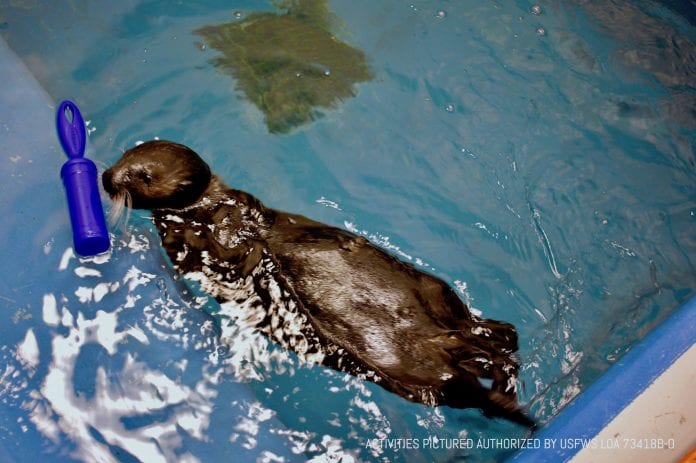
A male northern sea otter pup found unresponsive at Bishop’s Beach in Homer on New Year’s Day is now swimming and grooming on his own at the Alaska SeaLife Center in Seward.
The pup, estimated to be about four months old, is being bottle fed a milk matrix concocted at the SeaLife Center to mimic what he would be getting from his mother, plus cut up seafood, said Chloe Rossman, communications coordinator.
While a sea otter at this age would generally be solely dependent on its mother’s milk, ASLA staff speculates that he had begun weaning, because he is very interested in eating solid food.
He is under 24-hour care.
“We are allowing him to groom himself, but we still have to offer assistance at times to ensure his coat condition continues to improve,” said Lisa Hartman, husbandry director. Since sea otters have no blubber layer, good fur condition is critical to their survival.
The pup was discovered unresponsive on the shore with very dry fur, which indicated the pup had been stranded for quite a while. With approval of the U.S. Fish and Wildlife Service, the SeaLife Center’s Wildlife Response Team brought the otter to the center, where he was found to be severely dehydrated and malnourished. The pup also has a small seizure caused by low blood sugar, but he was stabilized with intravenous fluids and a tube feeding.
ASLC is a rehabilitation facility. Once the pup is rehabilitated, his future home will be determined by the National Oceanic and Atmospheric Administration and U.S. Fish and Wildlife. Any animal rescued at that young age is likely to need human care for the rest of their life, Rossman said.
The SeaLife Center operates a 24-hour hotline for reporting stranded marine animals. Anyone finding a stranded or sick marine animal should avoid approaching or touching the animal and call 1-888-774-SEAL.














